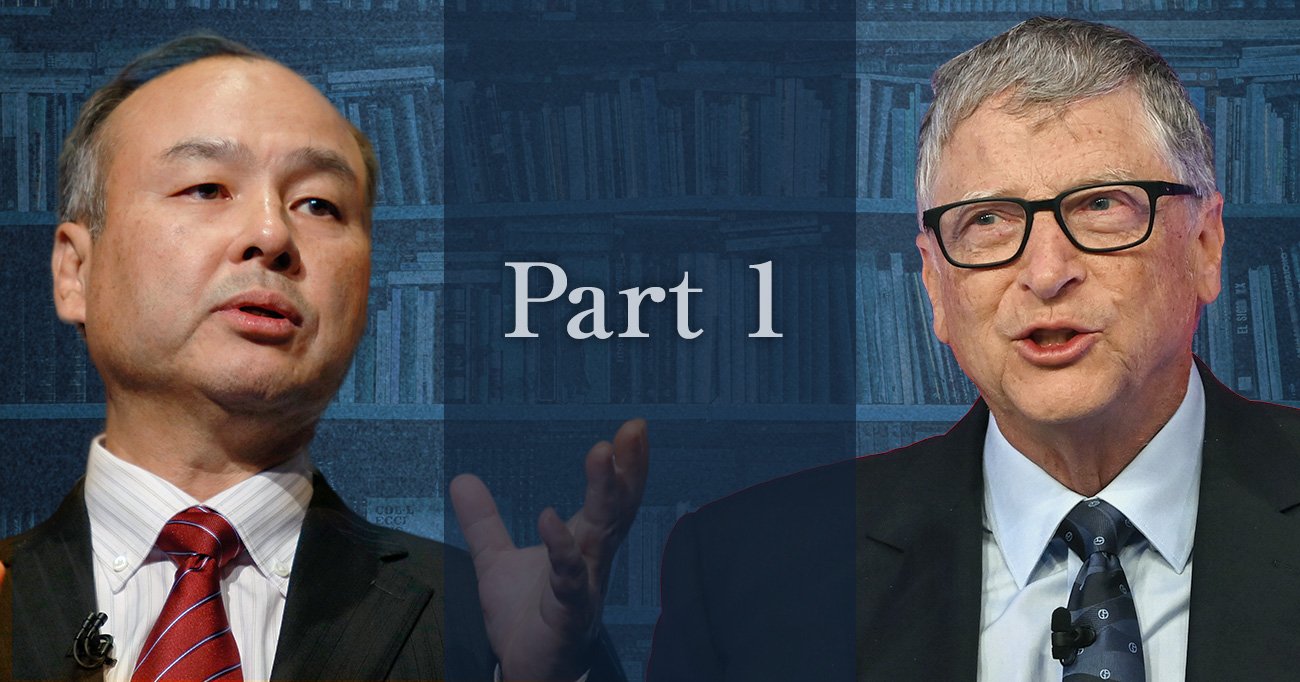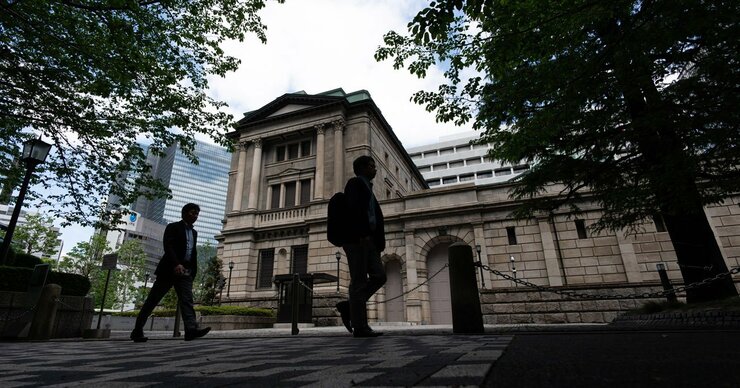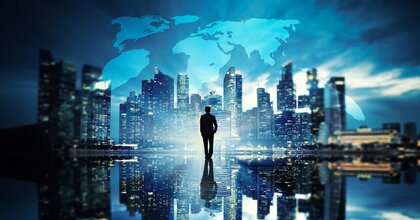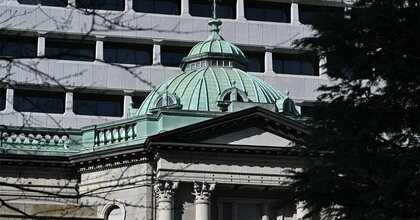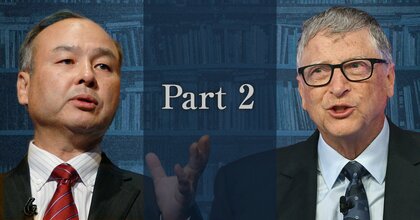Bill Gates’ Insight: Who is Masayoshi Son? - Part 1
ーーIt has been more than thirty years since the last time I interviewed you. Firstly, can you tell us your impression about the photos from 38 years ago?
Well, those early days were fantastic. I had the chance to work with amazing people, whether it was Paul Allen, Kazuhiko Nishi or Masa (Masayoshi Son). A small group of people believed in personal computers and the magic they could provide.
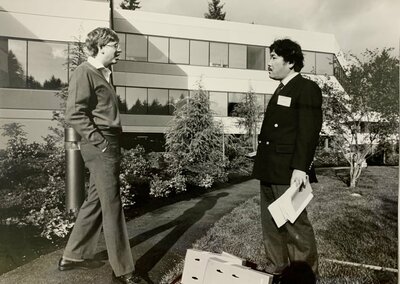 An interview with Bill Gates conducted 38 years ago by Atsuo Inoue. Photo: Kazuhiro Inoue
An interview with Bill Gates conducted 38 years ago by Atsuo Inoue. Photo: Kazuhiro Inoue
Japan was a very important part of Microsoft's work because there were several early personal computers and key technologies, not just the NEC machine, but so many others, such as Oki, Fujitsu, and Mitsubishi. There were dozens of created things, and Microsoft was lucky to work on those.
In those early days, Masa distributed software, but then he moved to do a lot more than that. It is nice to look back!
As for Microsoft, we have our 50th anniversary next year; those photos you showed are key in our history. We had been in an office park. We had just moved to that campus in early 1986 because we bought a huge piece of land to bring all our people together.
Of course, I was still pretty young at that time; I was 31. The IBM PC came out in 1981, and we were starting with Windows. It was not very good, and it wasn't until 1995 that our vision truly succeeded.
So, those were amazing times. And Microsoft's vision to enhance the importance of software and computing came true largely.
ーーI must say congratulations on receiving the Grand Code of Rising Sun from the Japanese government in 2020 because of your philanthropy. What are your philanthropic goals, and what progress have you made toward achieving them? What other issue areas do you believe need further attention?
I'm super lucky that through the success of Microsoft, I have a lot of resources, which have largely gone and will continue to go into the Gates Foundation.
And so in 2000, when I was turning over the CEO role to Steve Ballmer, I started the foundation and then moved full-time to that in 2008. Since then until now, I've worked part-time for Microsoft on various strategies, including AI.
My full-time work at the Gates Foundation focuses on global health, which is our biggest area. In some ways, our foundation is not as visible because we focus mostly on developing countries where people face huge challenges such as mothers dying in childbirth and various infectious diseases like HIV, tuberculosis, malaria, diarrhea or pneumonia.
Our foundation addresses the lack of market incentives to create products, such as vaccines and drugs, by funding science philanthropically. We are working with many companies, including key partners in Japan, who care about these issues and help everyone get healthy. The Japanese government is also a key partner to the Gates Foundation by providing a budget for helping countries directly and by generously providing the Global Fund and GAVI (The Global Alliance for Vaccines and Immunization).
We have had great success working with partners for 24 years since we started. The number of children under five who die each year has been reduced from well over 10 million to under 5 million thanks to new drugs, new vaccines, and anti-malaria bed nets. Though we're also working in other areas like agriculture, our biggest spending and success is global health.
ーーHow did the collaboration between you and Masa, as it relates to Breakthrough Energy, come about? What stands out to you about this partnership, and what, in your view, makes this such a significant collaboration?
We have known each other for a long time, going back to the very early days of the Japanese personal computer industry. And, we had made some investments in internet-related ventures together.
In 2015, when I was raising money for Breakthrough Energy, I reached out to Masa. Initially, I asked him for 50 million dollars, but he responded, "No. What do you really need?" At that time, I was hoping to announce fairly soon but could not raise all of the money. Eventually, he came in very generously by giving us 100 million.
He was incredibly generous and asked what would be most helpful. So, he provided significant support by joining the second round of funding just a few years ago. In any case, we've supported each other and stayed in touch. Masa is a big believer in addressing climate change and has invested, both personally and through SoftBank, in ventures like solar energy. We often meet to discuss the latest digital technology and climate change.
ーーWhat have you observed about Masa's investment approach? Are there similarities or differences between Masa and Warren Buffet?
Well, they are certainly very different in terms of their style. Warren does not invest in advanced technology. He usually avoids investments that are too risky, even if there is a possibility it might be worth ten times what was invested.
Masa lives on the cutting edge, and Warren admires that, but it is not his style. What Masa did in so many areas, such as internet stocks and now AI-related things, his overall track record is pretty unbelievable. Like right at the start, his investment in Alibaba did very well. But as he always points out, his track record has been incredible even without that. As tech stocks go in and out of favor, he's had some ups and downs.
But overall, the return has been incredibly positive. And he is funding very advanced technologies that have a broad societal impact, not just for the investment results. So he is really pushing the field forward. He has a good attitude about the fact that he's had a lot of successes but also a few things that didn't work out. He's still unabashed that he will help drive this with the next amazing generation of AI companies. So, I don't see Masa stepping back. Warren is like that too. He is 93 and still working full-time. Masa and I hope we're as healthy and vigorous as Warren is when we turn 93.
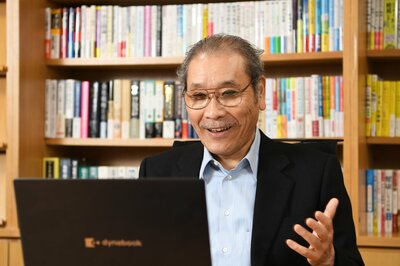 Atsuo Inoue interviewing Bill Gates. Photo: Motoyuki Ishibashi
Atsuo Inoue interviewing Bill Gates. Photo: Motoyuki Ishibashi
ーーYou met Warren Buffett in 1991. It's a long relationship with Warren Buffett, right? Is that correct?
Yeah, I have had a close friendship with Warren for 33 years. And, even though Warren's not in my industry, his wisdom has made a huge difference to me. We still talk every couple of weeks. We have long phone calls about how interesting the world is, the world of business and politics, and he's continued to do unbelievable work at Berkshire.
By many measures, he's the most successful investor ever. In fact, I went to Omaha, where he holds his annual meeting, which he loves. He just put out his latest annual letter, and then he had that shareholders meeting with many of his fans attending, and I was there.
The second part is scheduled to be published on July 1st. If you don’t want to miss it, you can follow the series to receive new articles via email.

